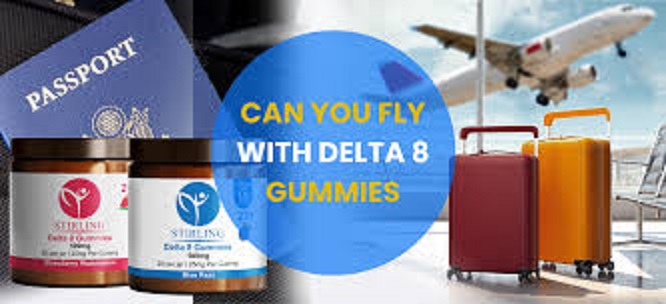Traveling with wellness products like Delta 8 gummies has become a hot topic—especially as more people turn to these hemp-derived edibles for relaxation, anxiety relief, or sleep support. But while they may be legal in many parts of the U.S., taking them across borders raises serious questions. Can you bring d8 gummies on an international trip? What are the legal risks, and how do airport security and customs agents treat them? In this article, we break down everything you need to know before packing Delta 8 for your next international adventure.
1. What Is Delta‑8 and Is It Federally Legal?
Delta‑8‑THC is a naturally occurring cannabinoid found in hemp and cannabis, chemically similar to Delta‑9‑THC, yet typically less potent. Under the 2018 U.S. Farm Bill, hemp and its derivatives are federally legal as long as they contain no more than 0.3% Delta‑9‑THC by dry weight. Delta‑8 typically meets this threshold and is considered legal at the federal level.
However, legality isn’t straightforward. Even though Delta‑8 is hemp-derived, state laws vary—several states have outright banned it.
2. Flying Within the U.S.
TSA Rules
TSA policy currently allows hemp-derived cannabinoids under 0.3% THC. Their screening doesn’t specifically target Delta‑8, but any cannabis-like product may trigger further inspection. Official TSA guidance states:
“Marijuana and certain cannabis‑infused products… remain illegal under federal law except for products that contain no more than 0.3 percent THC on a dry weight basis.”
Airlines & State Laws
Even if TSA permits it, airlines and states may impose stricter limits. For example, Delta Air Lines bans marijuana-like items; if your Delta‑8 is misinterpreted, it might be confiscated. Meanwhile, if traveling to or from states that prohibit Delta‑8 (e.g., Florida, New York, Colorado), you face potential confiscation or legal complications.
Packaging & Documentation
To reduce hassle:
- Keep gummies in original packaging with labels.
- Bring a Certificate of Analysis (COA) or lab report showing THC content ≤ 0.3%.
- Disclose them if asked, and stay calm—TSA agents have discretion.
Delta‑8 edibles are often less conspicuous than flower or vape cartridges, but they can still be flagged.
3. Traveling Internationally: Major Risks
Most Countries Don’t Recognize Delta‑8
Unlike U.S. federal law, many countries do not differentiate hemp-derived THC. They treat any THC product as illegal. As a result, bringing Delta‑8 across borders is highly risky.
Severe Penalties
Cannabis penalties abroad can be harsh—even for small amounts. In countries like China, Japan, UAE, Singapore, and others, possession of Delta‑8 can result in fines, arrest, or imprisonment .
Layover Issues
Even if your destination is lenient, a strict layover country could cause problems. For instance, traveling through the UAE en route to Canada poses serious risk—even a misplaced gummy can mean arrest.
Exceptions: A Few Countries May Tolerate It
Some places with permissive cannabis laws (Canada, Mexico, Uruguay, South Africa, certain provinces) may allow Delta‑8—but that doesn’t guarantee acceptance, especially for imported products.
4. Why It’s Not Worth the Risk
- Strict airport enforcement: Customs and border agents often have little tolerance for THC products, regardless of type .
- No legal workaround: U.S. Farm Bill protections don’t apply internationally.
- Unpredictable detection: Sniffer dogs, trained agents, or routine baggage checks may catch it.
- Harsh penalties: Even if you’re not prosecuted, detention, missed flights, and ruined vacations are real risks.
Overall, international travel with Delta‑8 is ill-advised. Unless you’re absolutely certain about local laws and safe transit routes, the downsides outweigh the benefits .
5. Recommendations for Travelers
Domestic (Within U.S.)
- Stick with hemp-derived edibles (gummies) over flower or vapes.
- Pack them in carry-on or checked baggage—both are allowed.
- Always carry COA and original packaging.
International
- Do not travel with Delta‑8—better to leave it behind.
- If THC relief is essential abroad, purchase locally, but only where legal.
- Prefer trusted CBD products (<0.3% THC), though even CBD can be illegal in some countries—check before you go.
Plan Ahead
- Research laws of all countries along your route.
- Check your airline’s policy.
- Consider medical alternatives or other stress-aids permissible abroad.
- If traveling domestically through restricted states, avoid carrying it at all.
6. Final Takeaways
| Journey Type | Delta‑8 Travel Advice |
| Domestic (U.S.) | Allowed if legal in both states and under 0.3% Delta‑9 THC; keep packaging and COA ready; respect airline/state rules. |
| International | Do not bring it. Laws are often stricter; penalties are harsh; even CBD can be illegal. |
Flying domestically? Proceed with caution and preparation. Flying internationally? It’s safest to leave Delta‑8 gummies at home and explore legal substitutes if needed.
Final Thoughts
Delta‑8 gummies are federally legal in the U.S., but state laws and airline policies vary. TSA won’t automatically confiscate them if under 0.3% THC—but misunderstandings are possible. Never bring Delta‑8 overseas—local laws are unpredictable and penalties can be severe. If you must fly internationally, skip it altogether and look into legal alternatives where you’re landing.
Safe travels—and when in doubt, err on the side of caution!







